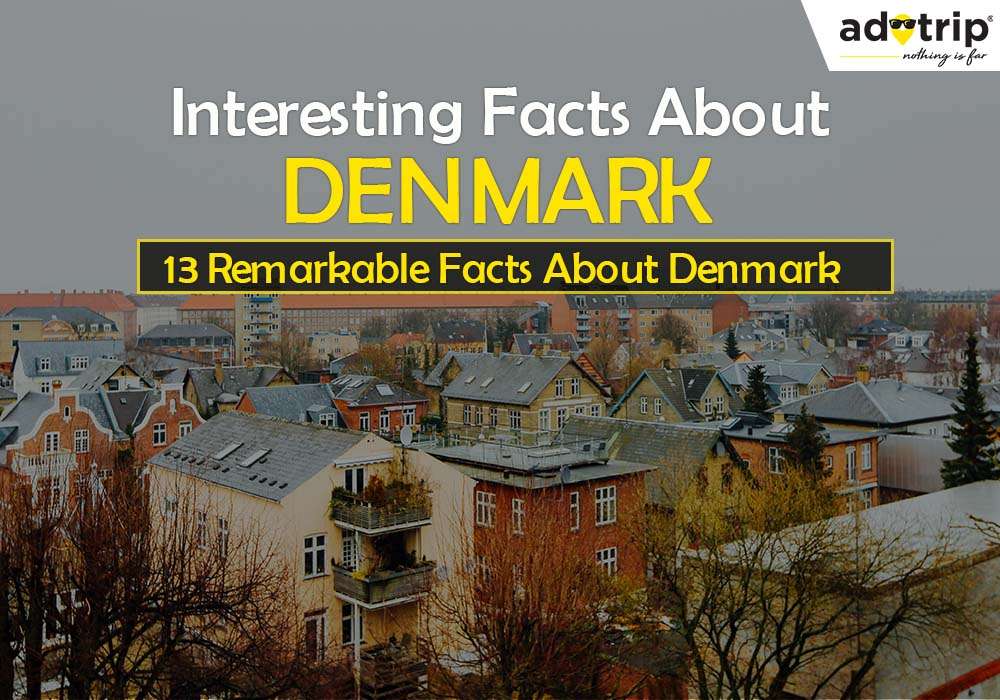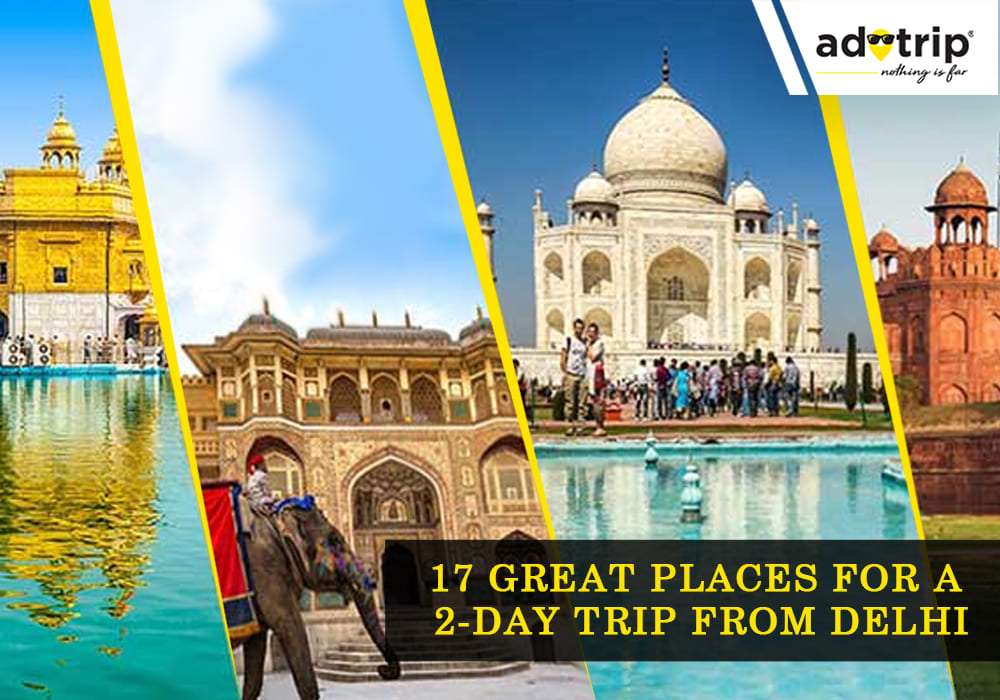
Last Updated At: 12-Mar-2024
13 Fascinating Facts About Denmark | You Need To Know In 2024
Situated in the heart of Scandinavia, Denmark is a captivating country filled with a rich history, culture, and natural beauty. While it may be one of Europe's smaller nations, its influence on the world far exceeds its size. From the legendary Vikings who once roamed its shores to its modern-day contributions in design, sustainability, and cuisine, Denmark has an array of intriguing Danish architecture facets waiting to be uncovered.
In this blog, we'll delve into the lesser-known aspects of Denmark, unveiling a mosaic of surprising and delightful facts that will not only pique your curiosity but also deepen your appreciation for this enchanting land.
List Of 13 Fascinating Facts About Denmark
From the concept of "hygge," which has taken the world by storm, to its renowned cycling culture and mouth watering pastries, Denmark offers a diverse range of topics to explore. Whether you're planning a trip to Denmark, have Danish heritage, or are simply curious about unique Danish traditions, scroll further to unravel the unique and captivating facts that make Denmark an exceptional destination.
- The World Happiness Report
- The Danish Flag: Oldest National Flag in Continuous Use
- The Birthplace of LEGO
- The World's Oldest Monarchy
- The Kingdom of Greenland
- The Bicycle-Friendly Nation
- The Little Mermaid Statue
- Famous landmarks in Denmark
- Danish Designs: Timeless Elegance
- Noma - The World's Best Restaurant
- Denmark, is a Country of Naturally Cosy People
- Legends of the Viking Age
- The Island of Funen: Hans Christian Andersen's Birthplace
1. The World Happiness Report
Denmark consistently stands out as a shining example of happiness on a global scale, earning its place among the top countries in the World Happiness Report year after year. Denmark's exceptional quality of life results from its robust social welfare system, excellent healthcare, and comprehensive education, all of which contribute to a strong sense of security and belonging among its people. One of the key factors in Denmark's happiness is its strong emphasis on work-life balance and the renowned concept of "hygge," promoting cosiness and contentment in everyday life.
2. The Danish Flag: Oldest National Flag in Continuous Use
The Danish flag, known as the "Dannebrog," holds a special place in Danish history. According to legend, it fell from the sky during a battle in the early 13th century, inspiring the Danish troops to victory. Today, the Dannebrog is the world's oldest national flag in continuous use. It's simple design of a white cross on a red background represents a sense of unity and pride among the Danish people.
3. The Birthplace of LEGO
Denmark holds a special place in the hearts of millions worldwide as the birthplace of LEGO. This beloved interlocking brick toy has captivated imaginations for generations. The LEGO Group's headquarters in Billund, Denmark, features LEGOLAND, a theme park dedicated to the colourful world of these bricks. Denmark's association with LEGO is so profound that it's become a point of national pride, showcasing its reputation for innovation and design. So, when you think of Denmark, it's not just the picturesque landscapes and historic sites that come to mind but also the boundless world of LEGO that has left an indelible mark on the global imagination.
4. The World's Oldest Monarchy
The Danish monarchy can be traced back over a thousand years to Gorm the Old, who reigned in the 10th century. The current queen, Queen Margrethe II, ascended to the throne in 1972 and is a beloved figure in Denmark. The monarchy is essential to Danish culture and history, and its palaces and castles are popular tourist attractions.
Read More : Famous Festivals Of Denmark
5. The Kingdom of Greenland
Greenland is the world's largest island, and despite its remote location, it is an integral part of the Danish Kingdom. Greenland's stunning natural beauty, towering icebergs, and unique wildlife draws adventurers and researchers worldwide.
6. The Bicycle-Friendly Nation
Denmark is renowned as a bicycle-friendly country, and it's no exaggeration to say that cycling is deeply ingrained in the nation's culture. With a vast network of dedicated bike lanes, comprehensive bike-sharing programs, and flat terrain, Denmark offers ideal conditions for cyclists of all levels. This commitment to sustainable mobility reduces traffic congestion and carbon emissions and promotes a healthy lifestyle. Exploring Denmark on two wheels immerses visitors in its scenic landscapes and vibrant urban centres while embracing a beloved Danish tradition.
7. The Little Mermaid Statue
The iconic Little Mermaid statue in Copenhagen stands as one of Denmark's most revered landmarks. Perched gracefully on a harbour rock since 1913, this statue pays homage to Hans Christian Andersen's beloved fairytale. Despite her petite size, she captures the hearts of countless visitors from around the world, drawn by her enduring charm and enchanting story. Over the years, the Little Mermaid has faced incidents of vandalism and theft, yet her spirit remains unbroken, symbolising Copenhagen's enduring connection to its rich cultural heritage and the enduring power of storytelling. A visit to this maritime masterpiece is a must for anyone exploring Denmark's capital.
8. Famous landmarks in Denmark
Denmark boasts a wealth of famous landmarks that reflect its rich history and distinctive culture. Among the most iconic is the Little Mermaid statue, perched on the Copenhagen waterfront, inspired by Hans Christian Andersen's beloved fairy tale. Another must-see is the enchanting Tivoli Gardens, one of the world's oldest amusement parks, offering a delightful blend of nostalgia and modern entertainment. In the historic city of Roskilde, the Roskilde Cathedral, a UNESCO World Heritage site, showcases stunning Gothic architecture and houses the final resting places of Danish monarchs. Denmark's landmarks reflect its rich cultural heritage and innovation, making them not only historic treasures but also symbols of Danish pride and ingenuity.
Read More : Things To Do In Denmark
9. Danish Design: Timeless Elegance
Designers like Arne Jacobsen, Hans J. Wegner, and Poul Henningsen have created iconic pieces of furniture and lighting that are celebrated worldwide. Danish design principles known for the use of natural materials and clean lines, creating a timeless and enduring aesthetic.
10. Noma - The World's Best Restaurant
Copenhagen is home to Noma, a restaurant that has won the title of "World's Best Restaurant" several times. A meal at Noma is a culinary experience like no other and a testament to Denmark's culinary creativity, where you can taste surprising Danish cuisine that will refresh and delight your mood.
11. Denmark is a Country of Naturally Cosy People
Denmark is often hailed as a country of naturally cosy people, thanks to the cherished Danish concept of "hygge." This unique cultural phenomenon embodies the art of creating warmth and contentment in everyday life. Danes excel at crafting inviting atmospheres, savouring life's simple pleasures, and cherishing quality time with loved ones. Candles, snug blankets, and shared meals play pivotal roles in achieving hygge, fostering an environment where people genuinely thrive. This emphasis on comfort and connection contributes to Denmark's consistently high rankings in global happiness and well-being indexes, making it a nation that truly understands the secret to living a fulfilled and cosy life.
12. Legends of the Viking Age
Denmark's history is closely tied to the Viking Age, and remnants of this legendary era can still be seen today. The country is dotted with Viking burial mounds, fortresses, and museums dedicated to this fascinating period.
13. The Island of Funen: Hans Christian Andersen's Birthplace
Funen, one of Denmark's picturesque islands, is known as the birthplace of Hans Christian Andersen, the famous author of fairy tales such as "The Little Mermaid" and "The Ugly Duckling." The city of Odense on Funen is home to the Hans Christian Andersen Museum, where you can learn more about the life and works of this beloved storyteller.
Read More : Places To Visit In Denmark
Denmark is a country that seamlessly blends its rich history with a modern, forward-thinking outlook. Whether you're exploring its charming cities or the stunning landscapes of its far-flung territories, Denmark offers many fascinating experiences waiting to be discovered.
From finding the best accommodations to discovering hidden gems of Denmark, Adotrip ensures that every aspect of your journey is enjoyable and hassle-free. If you're feeling adventurous, Adotrip offers curated travel packages tailored to suit your interests and budget. So why wait? Let Adotrip be your guide on this exciting adventure through Denmark!
With us, nothing is far!
Book Denmark Tour Package
FAQs About Interesting Facts About Denmark
Q1. What are some famous Danish contributions to the field of design?
A1. Denmark has made significant design contributions, including iconic furniture like Hans J. Wegner's chairs and Arne Jacobsen's Egg chair. The Danish Design movement's emphasis on simplicity and functionality has left an indelible mark on global design aesthetics.
Q2. How did Denmark's Viking history influence its culture and traditions?
A2. The spirit of exploration and seafaring from the Viking era is reflected in the Danish love for the sea, maritime industries, and even modern design. Viking symbols and mythology remain part of Denmark's cultural identity, celebrated in festivals and historical reenactments.
Q3. What is the significance of the Little Mermaid statue in Copenhagen?
A3. The Little Mermaid statue in Copcenhagen holds immense cultural significance. It's a beloved national icon, representing Copenhagen's maritime heritage and serving as a major tourist attraction.
Q4. How does Denmark rank in terms of happiness and well-being among countries?
A4. Denmark consistently ranks among the world's happiest and most prosperous nations. Its high scores in well-being indicators, like healthcare, education, and work-life balance, contribute to its top rankings in global happiness reports, showcasing its commitment to citizens' overall quality of life.
Q5. What is the Danish concept of "hygge" and its cultural importance?
A5. Hygge is a Danish word that can be translated as "cosiness" or "comfort." It is an important part of Danish culture and is often credited with helping Danes to be some of the happiest people in the world.
--- Published By Adotrip
Latest Blogs

17 Best Places for 2 Days Trip from Delhi

Top 10 Hill Stations Near Bangalore for an Unforgettable Get...

Top 10 Hill Stations Near Chennai For a Perfect Getaway

10 Best Hill Station Getaways Near Gurgaon for Peace Seekers

10 Astonishing Underwater Temples of India You Must Visit in...
Speak to our experts
Popular Flights
Vadodara to Delhi Flights
Srinagar to Chandigarh Flights
Nagpur to Jammu Flights
Mangalore to Vishakhapatnam Flights
Kolkata to Guwahati Flights
Pune to Kolkata Flights
Ahmedabad to Dehra Dun Flights
Patna to Thiruvananthapuram Flights
Varanasi to Amritsar Flights
Mumbai to Ahmedabad Flights

.jpg)




 Dubai
Dubai Malaysia
Malaysia USA
USA






